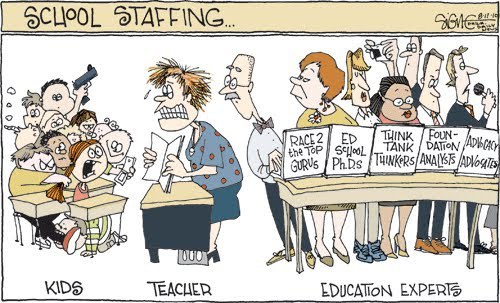
This was a reflection I wrote for one of my classes in my education Masters program. It was a response to a series of articles about new efforts at improving middle schools. One of those was an example of project-based learning, as students worked on a larger project in lieu of traditional classes. Another was a program in which teachers spent more time planning for the coming academic year.
I don’t know if Hill feels guilty about the “betrayal of traditional pedagogy.” He seemed more concerned about the response of parents and teachers, than about self-doubt. He was aware of the risk when deviating from the standards. This We Believe does provide reassurances for any educator devising an integrated program, so there are certainly good arguments for it. He shouldn’t feel guilty, because he’s making an effort at positive change. However, there are still legitimate concerns for educators to be cognizant of.
When reading articles in academic journals, anecdotes in larger education texts, or works of journalism dealing with new teaching strategies, we are much more likely to read about experiments that teachers take that end up being effective than the things they try that don’t work. A noble experiment that turns out being a disaster is less likely to be written about, even though there can be tremendous value in demonstrating to teachers the things that they shouldn’t try, and in determining why something was ineffective. A counterargument is that the floor is so low, especially in high needs schools, that an effort at change is unlikely to make things noticeably worse.
The Strive Prep model was demonstrably successful, and it has a few advantages. One aspect is that they go for low hanging fruit, especially with summer vacations and curriculum planning. The effects of “summer learning loss” have been known for some time, but other systems haven’t managed to solve it. It’s also well-known that teachers benefit from spending significant time planning curricula and working together.
The article discusses the advantages of the system being new, and there’s a lot to be said for that. When making major changes, as in adopting an year-round model or giving teachers four weeks to plan the academic year together, they don’t have to worry about bureaucratic sclerosis or systems (and employees) set in old and often outmoded ways. They’re able to put the needs of the students first.
What stands out about the methods that work in the three articles is that these are based on the needs of the individual students, rather than the set curriculum to one specific class. Asking kids to make a project about their heroes or the touring schedule for a hypothetical band allows them to use what they’ve learned in ways that are relevant to them. The hero project fosters community involvement, and helps students consider who their models for ideal behavior are. Sometimes, parents aren’t adequate role models, while community leaders, sports stars, singers and actors can have significant personal failings, leaving children without a strong example to follow. The project is one step towards providing that, helpful in Middle School where children are making key decisions about the types of people they’re becoming.
The Tour Across America project requires students to develop their understanding of research skills, math, public speaking, writing, art, and geography. Working together in small groups also prepares them for the professional world. It should work better with teachers working together, rather than a Language Arts teacher using his time with the students to reinforce material learned elsewhere. The Strive Prep model eliminates most of the transition time, with teachers being the ones to switch classrooms, which does provide an integrated curriculum with a significant advantage of block scheduling as the children are educated by specialists in the content area.
